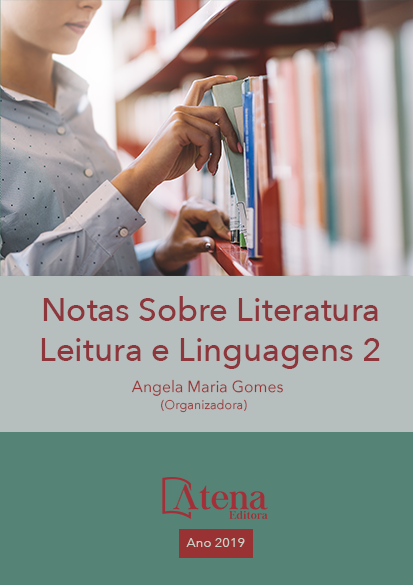
IMPLICAÇÕES PEDAGÓGICAS DO USO DA INTERTEXTUALIDADE NO ENSINO DE LITERATURA NO ENSINO MÉDIO
Este artigo visa delinear como a
intertextualidade pode ser aplicada nas práticas
pedagógicas do Ensino Médio, pois o uso desse
fenômeno permite ao professor fazer do aluno
um coautor do texto literário, um novo sujeito,
que descobre, compara, transforma, aprende,
ensina. Daí a necessidade dessa abordagem,
que a escola deve permitir que se faça dentro
e fora dela, abordagem essa que o professor
pode utilizar para formar leitores críticos,
tendo a escola como sua maior responsável.
A fundamentação teórica deste trabalho
pautou-se no que preconiza Kristeva (1974a),
a partir de uma franca influência dos trabalhos
realizados por Bakhtin (2012), desde seus
estudos iniciados na década de 20. A noção de
Intertextualidade, introduzida por Kristeva para
o estudo da literatura, chama a atenção para o
fato de que a produtividade da escritura literária
redistribui, dissemina textos anteriores em um
texto atual. Uma vez que todo texto literário
apresenta como característica uma relação,
implícita ou explicitamente marcada, com textos
que lhe são anteriores. Segundo Silva (2005,
p. 85), em geral, os documentos produzidos
como referencial para os professores, os PCN,
por exemplo, apresentam apenas contribuições
teóricas, mas não discutem, em termos
metodológicos, como os educadores poderiam
articular a teoria à prática em sala de aula. Foi
assim que, pensando em diminuir a distância
entre teoria e prática, propôs-se uma reflexão
sobre como a literatura poderia ser abordada
em sala de aula, tendo em vista as contribuições
do dialogismo da linguagem defendidas neste
artigo, com vistas à intertextualidade.
IMPLICAÇÕES PEDAGÓGICAS DO USO DA INTERTEXTUALIDADE NO ENSINO DE LITERATURA NO ENSINO MÉDIO
-
DOI: 10.22533/at.ed.70419250113
-
Palavras-chave: Intertextualidade, leitura literária, produção de textos.
-
Keywords: Intertextuality, literary reading, text production.
-
Abstract:
This article aims to outline how
intertextuality can be applied in the pedagogical
practices of High School, because the use of
this phenomenon allows the teacher to make
the student a coauthor of the literary text, a new
subject, who discovers, compares, transforms,
learns, teaches. Hence the need for such an
approach, which the school must allow to be
done in and out of it, an approach that the teacher
can use to train critical readers, with the school
as its main responsible. The theoretical basis of
this work was based on Kristeva (1974a), based
on a frank influence of Bakhtin’s works (2012),
since his studies began in the 1920s. The
notion of intertextuality, introduced by Kristeva
for the study of literature, draws attention to
the fact that the productivity of literary writing
redistributes, disseminates previous texts in a current text. Since every literary text
presents as characteristic a relation, implicitly or explicitly marked, with texts that are
previous to him. According to Silva (2005: 85), in general, the documents produced as
a reference for teachers, NCPs, for example, present only theoretical contributions,
but do not discuss in methodological terms how educators could articulate theory to
practice in the classroom. Thus, in order to reduce the distance between theory and
practice, it was proposed a reflection on how literature could be approached in the
classroom, in view of the contributions of the dialogism of language defended in this
article, with a view to intertextuality.
-
Número de páginas: 15
- RONALDO MIGUEL DA HORA


